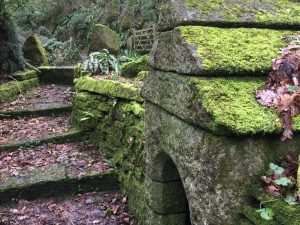St Keyne Wishing Well Halt to Causeland
The station is nostalgic cream-brown-GWR, invoking a glorious age of – when? The canopy is wooden, with that distinctive cut-out pattern that you only see on old railway stations. It must have a name. The replacement bus can’t get down these lanes and stops a 20 minute walk uphill from the station. There is a helpful map for stranded passengers who need to find the corner where the bus will stop.
The mill used to hold Paul Corin’s Magnificent Music Machines. I don’t know when he closed. Are the bones of a Mighty Wurlitzer laid out on the threshing floor?
The valley is losing its ability to hold the unexpected and the strange. What will we loose if all the creases and tucks are smoothed out, all the contours are Google mapped, all the ruins are renovated?
A vineyard has opened on the slopes. There are tours and tastings.
The restaurant that became a luxury spa-restaurant-with-rooms, stay-eat-retreat, still appears on Trip Advisor. The entrance is blocked by site fencing. There is fake red pillar box by the entrance, dead round box trees in aluminium planters, a dead olive tree in a circular wooden planter.
St Keyne’s Well
the moss full five fathoms deep
fruiting in its deepest shade
yet the Well is dry
yet a steady stream of water issues from the hedge opposite into the lane and a drain gurgles under the tarmac.
At the Well, I climb over a small slate vertical slab, down leaf-moulded granite steps, shivered by ferns. The well cover resembles a miniature church or mausoleum.
Keyne was a pious virgin princess.
‘The Quality that man or wife
Whom chance or choice attains
First of this sacred spring to drink
Thereby the mastery gains.’
So equal rights them – or even supremacy – for a woman. I write in my notebook: material for a modern retelling?
Later, Google says Keyne was not even ours. She was Welsh and went to all manner of places. Was she even here? Did she come on holiday in 600D, or move in for a while to try a slice of country life?
Later, Google says that an important man in times Victorian said that she “quite may well have been a man.” This being much more likely.
No contemporary sources about her or her life have survived. Accounts are untrustworthy.
The language of canals
The language of railways
The language of phone lines and fibre
The lost language of Magnificent Music Machines and the Mighty Wurlitzer
Later, Google says that the cut-out wooden canopies on train stations are called “dagger boards” or “dags”, dag from the old English term for jagged hanging cuts, or as Google coyly says, from the term for fecal matter hanging from a sheep’s bottom.

